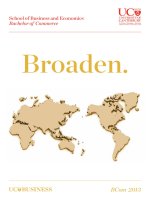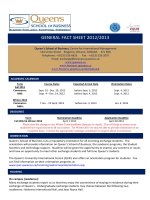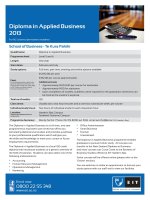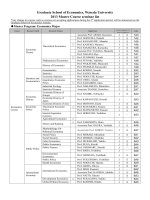School of Business International University Vietnam National University - HCM
Bạn đang xem bản rút gọn của tài liệu. Xem và tải ngay bản đầy đủ của tài liệu tại đây (813.65 KB, 107 trang )
AUN Self Assessment Report
At Program level
School of Business
International University
Vietnam National University - HCM
May 2011
1
Part 1: INTRODUCTION
Executive Summary
This document is prepared as the Self-Assessment Report of the School of Business, International
University, a member of Vietnam National University in Ho Chi Minh City (VNU-HCM), for
AUN accreditation [Exh.12.2 Decision - Internal AUN accreditation]. The report provides
detailed information on different aspects of quality, as per specified by the ASEAN University
Network, that the school have achieved so far.
In general the school is believed to provide quality services to its customers – the students, as
guided by a system of vision, mission, objectives and expected learning outcomes. The program
specification was well designed, leading to coherent program organization and content. They are
facilitated by modern didactic principles, curriculum, staff, supporting staff, infrastructure,
support systems and, quality assurance mechanism. These are further reinforced by the activities
of staff development, continuous evaluation and keeping abreast of feedbacks so that the quality
indicators of the students of the school has been satisfactory and it has received mostly positive
comments from all kinds stakeholders. The report concludes by a section of rigorous analysis of
strengths and weaknesses that points out the opportunities of further quality improvement.
Organization of Report
The report is divided into three parts.
Part One provides a brief introduction about the International University as well as its School of
Business, which is to be examined in this report.
Part Two includes the analyses of the prescribed quality dimensions one-by-one as classified by
the accreditation body of AUN.
Part Three of the report is dedicated to the review of the strengths and weaknesses of the school
based on analyses in Part Two, and the suggestions to improve quality in the future.
2
Introduction of the University and School
The International University (IU) is a member of the Vietnam National University in Ho Chi
Minh City (VNU-HCM), and the first public English speaking university in Vietnam. Established
in 2003, IU’s vision is to become one of the nation’s leading research universities. The university
focus its efforts on cultivating student-friendly environment for the development of critical
thinking and effective application of theories learned in class, combining theories and practical
ideas in various learning activities, close interaction with industry and in-depth research studies
with state-of-the-art facilities and laboratories.
Across the spectrum of IU’s own and twinning programs with prestigious universities in the US,
UK, and Asia-Pacific, IU offers a wide range of high quality education options to domestic and
international students. The university has also established strong relationships with local
businesses and industries to improve its practical training curricula and to facilitate students’
career opportunities via first-hand real world experiences.
In the long run, through the internationalization of academic environment, including strong
academic curricula, quality international faculty, supportive infrastructure and management
system, IU will develop into a multi-discipline university offering internationally-recognized
degrees at all levels of higher education.
As the largest school of IU, the School of Business is committed to provide a set of programs
integrating latest developments in management and innovative solutions to business challenges.
The School of Business aims to train students for professional and ethical working attitude, useful
knowledge and practical business skills to prepare them for positions in local and international
firms.
With five concentrations: Business Management, International Business, Marketing, Accounting
and Finance, and Hospitality Management, the academic programs are delivered by local and
international lecturers who had been trained at different foreign universities in the world. The
students enjoy a dynamic training environment, latest study materials, advanced teaching
approaches, and comfortable facilities including a modern business simulation laboratory.
3
Student graduated from the School of Business in the previous years have joined FDI enterprises,
multinational companies as well as local corporations with positions that suit their training from
IU.
Part 2: QUALITY BY AUN-QA CRITERIA
1. Vision, Mission, Value, Objectives and Expected Learning
Outcomes
Mission and Vision Statement of the International University (HCMIU), Vietnam National
University in Ho Chi Minh City (VNU)
In the short term, the International University strives to become a moderately sized, researchoriented university, with an international work and study environment, where a strong faculty and
staff provide quality training in key subjects to a highly motivated student body of Vietnamese
and international learners and whose reputation as a top-level institute of higher learning attracts
top-notch learners, researchers and lecturers.
The International University will soon create the medium-term and long-term development
strategies for which will introduce and implement new policies on salary, clarify systems of
process, provide work and function descriptions for the whole university, and establish
international standards for the recruitment of staff and faculty.
The International University will also review and improve the training program with the goal of
providing our students with an international standard education, approaching the quality of
world’s top universities. The intermediate goal will be to match the academic standards of top tier
American universities, so as to permit transfers of credits and allow for future collaboration to be
based on the principles of equal cooperation and mutual benefit.
The International University will establish policies to ensure that 100% of staff and faculty will
be afforded the opportunity to receive domestic and overseas professional training, with the goal
of insuring that the training provided, research conducted and administrative support given are of
the highest possible quality.
4
Mission [Exh.1.4 Vision statement- IU Development Strategy 2006-2010, IU Development
Strategy 2011-2015]:
To provide international quality undergraduate and postgraduate education and training in
Engineering and Economics that can meet the development demands of Vietnam;
To conduct research and apply it to the industry and the society;
To play a key role in the development of the community.
Vision [Exh.1.4 Vision statement- IU Development Strategy 2006-2010, IU Development
Strategy 2011-2015]: Within five years, the International University will become a high quality,
research-oriented university with:
Courses taught according to international standards;
Dedicated and highly competent faculty;
Modern facilities for instruction and research;
Professional administration and staff;
High quality students;
Graduates are well trained in using modern technologies and current, best practices in
industry, and also able to work in international settings;
A reputation as a pioneer in higher education management.
Vision, Mission, Value and Objectives of HCMIU’s School of Business (SOB) [Exh.1.6
Learning Outcome vs. Course Matrix – BA]
SOB designs its Vision, Mission, Value and Objectives to build a strong foundation to support
HCMIU’s effort to develop it into an international and world-class university.
Vision
Inspired by the commitment of HCMIU to contributing to the development of the community and
the whole nation, the School of Business will be the school of choice for the best and the
brightest students in the nation, and for those who look for exceptional educational opportunities
in business. Besides, SOB will meet the demand of people who have the need of academic and
professional education in business. Additionally, SOB will be well-known locally, regionally and
5
globally for its quality, innovation and leadership; for diversified and excellent faculty; and for
providing academic, professional and research opportunities to ensure the success of its people.
Mission Statement
Our distinct mission, as a part of the first international public university in Vietnam, is to provide
students with the benefits of top-quality research school [Exh.10.11 Announcement of scientific
research for Students; [Exh.12.8 Minute of meeting for establishment scientific research
committee] in business. We commit to bring excellence in business education; to prepare lifelong
learners for professional fulfillment in the field of business and for real-world success; and to
develop future leaders [Exh.6.12 Regulations - Evaluation of self-development students] of our
nation through supportive and quality faculty, staff and academic environment. Students are given
opportunities to work with some of the nation’s best faculties to advance their arts and
humanities, knowledge, and professions.
Value Statement
As a part of the first public international university in Vietnam, the School of Business
understands and honors the public trust placed on us. We believe that the following values
exemplify our School:
Respect: We respect ourselves and others.
Integrity: We strive to maintain honesty and truthfulness; and to act in ethical ways.
Responsibility: We make decisions wisely after acknowledging the context and
considering the consequences of any course of action.
Diversity: We embrace the diversity of individuals, ideas and expressions.
Excellence: We value high standards for teaching, learning, and inquiry.
Leadership: We lead others toward excellence through trust, respect and encouragement;
and demonstrate leadership through collaboration, empathy and tenacity.
Objectives
Maintain an excellent quality of teaching and learning at both undergraduate and graduate
levels.
6
Retain and recruit high qualified faculty and staff to support the teaching, research and
service mission at SOB.
Innovate and enhance the learning environment to attract excellent students.
Strive for our leadership role in education and develop future leaders for the nation.
Collaborate with the industry to prepare students real-world knowledge and experience as
well as to pursue business researches for the benefit of the community and the country.
Expected Learning Outcomes [Exh.1.6 Learning Outcome vs. Course Matrix – BA; Exh.1.5
Learning Outcomes]
1. Business Knowledge
Upon completing the program, students will be able to:
a. Master the key frameworks, models, and skills that reflect the body of knowledge in their
major, and will apply discipline-based habits of analytical thinking to problems and
opportunities.
b. Be skilled in the analysis of both qualitative information and quantitative data. They will
be able to frame problems, apply appropriate analytical techniques, and draw valid
conclusions and recommendations.
2. Communication Skills:
Upon completion of the program, students will be able to:
c. to synthesize and summarize information and to professionally communicate their
analyses, arguments, and recommendations to a variety of audiences.
d. be skilled in written, oral, and visual communication and will be able to effectively
choose communication methods that are appropriate to the topic, objective, and setting.
3. Quantitative Skills
Upon completion of the program, students will be able to:
7
e. Understand, analyze and use quantitative data to make business decisions and report to
stakeholders.
f. Identify quantitative characteristics of a problem, to examine and interpret numerical data
and to analyze numerical data to derive conclusions.
4. Critical Thinking Skills
Upon completion of the program, students will be able to:
g. Evaluate, analyze and interpret information to solve problems and make business
decisions.
h. Interpret and evaluate unstructured situations; to define the problem; to apply theories to
ambiguous situations and to draw conclusions and implement solutions.
5. Technology
Upon completion of the program, students will be able to:
i. Demonstrate proficiency in the use of information technology.
j. Students will use information systems to select, manipulate and process data in a
meaningful way in order to make business decisions and use software tools to solve
accounting, financial and quantitative problems.
6. Ethics
Upon completion of the program, students will be able to:
k. Understand and evaluate ethical issues and situations to make business decisions.
l. Recognize ethical problems in both domestic and international business contexts identify
alternatives and make appropriate ethical choices.
7. Multicultural and Diversity
m. Students, particularly those who pursue the degree in international business concentration,
will develop an awareness and understanding of the cultural issues that impact business
operations in a global society.
8
n. Students will have a perspective, sensitivity and understanding of the global businesses
and global society; use their communications skills to resolve challenges [Exh.1.6
Learning Outcome vs. Course Matrix – BA].
Knowledge and Skills
Generic Knowledge
Expected
learning
outcomes
Mathematics, Social Science, e, f, m, n,
History, Culture, Environment
Generic Skills
Science.
Communication,
Computer c, d, e, f, g, h, i, j
skills, Critical thinking, Team
work, Self-regulating, problem
Specific Knowledge
solving, Self-learning
Understanding of key functions a, b, c, d, e, f, g, h, i, j
of
business
–
accounting,
finance, international business,
marketing,
operations,
management,
information
and
Specific Skills
statistics
Ability to use technology to j, k
Attitudes
solve business problems
Social ethical and responsibility, k, l, m, n
Professional
and
ethical
responsibility
Scientific knowledge and skill
for life-long learning
Learning and communication
skill for life-long learning
Perception of life – long
learning
9
a, b, c, e, k, l, m
l, b, g
h, m
2. Program Content
The content of the BA Program is developed in relation to the vision of university for being the
leading research university in the country. In particular, the Program content primarily reflects the
objectives [Exh.1.4 Vision, Mission statement- IU Strategy 2006-2010, IU Development Strategy
2011-2015] set above to provide learners with firm basic knowledge discipline and theories in
Business Administration as well as to help the learners pursue their particular interest. Therefore
the curriculum content is developed as a track that is directed towards the acquisition of
knowledge of Business Administration [Exh.2.1 Academic Calendar year 2010-2011].
Distribution of Contents
Since 2008, the content of the Program [Exh.1.8 Decision of BA Curriculum Establishment] has
been structured in an integrated curriculum as illustrated in Table 2.1. The curriculum structure is
characterized by four parts of education process which enable the students to learn various skills
and knowledge in design to develop their basic capabilities in Business Administration discipline.
These four parts are: General Education, Foundation Requirements and Elective Core courses,
Concentration Majors and Thesis Writing. Beside these parts, as required by the Ministry of
Education and Training [Exh.2.3 Minister of Education program framework; Exh.3.9 BA
Academic curriculum -Version 5], the graduates must take the course on Military Education and
receive the Certificate for this.
Table 2.1 Curriculum structure
Type
I. General Education
II. Foundation Requirement/Core
III. Concentration or Major
IV. Graduation Internship
IV. Thesis/Courses
Total
+ Certificate of Military Education (required)
+ Physical Education
Credit
62
31
30
3
12
138
10
General Education Requirements
All colleges and universities include a set of common courses in their curricula which
provide exposure to a wide variety of subjects considered to be necessary for the
educated individual. At the IU this is known as the General Education requirement
and consists of several areas such as mathematics, philosophy, natural sciences, social
sciences, legal system. It consists of 62 credits for General Education and 31 credits
for Foundation Requirements. All students at IU must complete the General education
and Foundation Requirement coursework in order to graduate [Exh.2.3 Minister of
Education program framework; Exh.3.9 BA Academic curriculum -Version 5]. This
coursework is generally foundational, meaning it is taken during the first 2 years of
any program. Freshmen especially focus on general education coursework
11
Table 2.2 General Education requirements
Type/Subject
1
2
3
Total
Academic English 1
Calculus 1
Introduction to Social Science OR
Introduction to Psychology
4 Microeconomics
5 Academic English 2
6 Macroeconomics
7 Calculus 2
8 Critical Thinking
9 Business Computing Skills
10 Vietnamese History and Culture
11
OR World Economic Geography
Introduction to Vietnamese Legal
12
13
14
15
16
17
11
12
System
Politics
Principles of Management
Statistics for Business
Quantitative Methods for Business
Research Methodology
Environmental Science
Physical Education
Military Education
Credit
Semester
62
4
4
1
1
3
1
3
4
3
4
3
3
1
2
2
2
2
2
3
3
3
3
10
3
3
3
3
3
3
3
4
4
4
12
Prerequisites
Academic English 1
Calculus 1
Foundation requirements
The foundation requirements are core subjects for all BA undergraduate students. It consists of 10
courses (or 31 credits). The students will take all of those subjects till the end of the junior year.
All subjects are of 3 credit courses.
Table 2.3. Foundation requirements
1
2
3
4
Type/Subject
Total
Introduction
to
Business
Administration
Principles of Accounting
Management Information Systems
OR E-commerce
Fundamental
of
Financial
Credit
31
Semester
3
1
3
3
3
4
3
4
3
4
5
Management
Principles of Marketing
6
Business Law
3
4
7
Organizational Behavior
Strategy
Formulation
3
4
3
5
3
5
3
6
8
9
Implementation
Production
and
and
Operations
Management
10 Business Communication
13
Prerequisites
Business Computing Skills
Introduction to Vietnamese Legal
System
Principles of Management
Quantitative Methods,
Statistic for Business
Major concentration courses
At the third year of the BA program, students might choose from five areas of
concentration which the School of Business – The International University provides as
follows:
For the Business Administration Program:
(i)
Business Management,
(ii)
International Business
(iii)
Marketing
(iv)
Hospitality Management
For the Finance and Banking Program:
(v)
Finance and Accounting
All the concentrations consist of concentration requirements and elective courses.
Elective courses can be changed to meet the requirements of industry and the availability
of experts.
Business Management
This concentration is an excellent preparation part for students who wish to study
administrative sciences or are interested in general management and management trainee
positions. Business Management concentration provides undergraduate students with
necessary knowledge and skills to understand and undertake various management
positions in industry.
After graduation, the students are expected to understand and apply their knowledge on
individual and organizational behavior in management practice, master leadership skills,
decision-making skills, other skills on operating, human resource planning, businessstrategic planning and adjustments to meet the changing business environment.
14
The graduates are able to develop competencies and master general skills at least in five
areas of business management including: operation management, marketing management,
human resource management, financial management, and international business
management. In addition, the students will learn how to implement various functions of a
manager and solve managerial problems relating to planning, organizing, leading,
motivating, coordinating, as well as controlling. Concentration requirements as well as
elective courses of business management are designed and available to those interested in
this specialized area.
Furthermore, Business Management also focuses on the behavior of individuals and
groups within formal organizations, with particular emphasis upon the application of
theory and research to management practice. Topics receiving primary emphasis include
leadership and motivation of personnel, decision making, the adaptation of organizations
to their environment and the planning for and use of human resources in both the public
and private sectors. Table 2.4 illustrates the concentration requirements for the Business
Management concentration.
Table 2.4 Concentration requirements of BM
No
1
2
3
4
5
6
Course Code
BA154IU
BA018IU
BA156IU
BA022IU
BA121IU
BA020IU
Course Name
Entrepreneurship and Small Business Management
Quality Management
Human Resource Management
Logistics and Supply Chain Management
International Business
Business Ethics
Total credits:
15
Credits
3
3
3
3
3
3
18
Table 2.5 provides the elective courses of Business Management as follows:
Table 2.5: Electives of BM
No
1
2
3
4
5
6
7
8
9
10
Course Code
BA171IU
BA151IU
BA140IU
BA051IU
BA158IU
BA160IU
BA176IU
BA023IU
BA098IU
BA178IU
Course Name
Risk Management
International Business Management
Business Strategy Simulation
International Financial Management
Organizational Design and Changing
Negotiation and Relationship Management
Franchising
Project Management
Leadership
Special Research in Business Management
Total credits:
Credits
3
3
3
3
3
3
3
3
3
3
12
International Business
The concentration in International Business provides undergraduates with the analytical
tools and conceptual framework needed to understand the international financial, political,
and economic environment, how that environment influences a firm's strategy and
performance, how culture plays a role in guiding a firm's strategic activities, and how a
firm can leverage home and host country resources to overcome challenges inherent in
managing a multinational enterprise. The academic program allows students to understand
international business from three interrelated perspectives: international economics and
finance, international marketing, and international corporate strategy. After graduation,
the students are expected to develop their competencies and skills in: understanding and
applying theoretical models and analyzing tools needed to have a thorough grasp of
international business environment, including finance, politics, economics, culture, etc.
and its impact on the company’s strategies and performance. The students will master a
business’s functional operations in the context of globalization in three interdependent
areas that may have impact on the international business’s success, including:
16
International economics and finance, international marketing and international business
strategies.
International Business focuses on the cross-cultural psychology and multinational
management,
International
Business,
Organizational
Design
and
Environment,
International Trade, International Marketing and Finance.
The graduates of this concentration might start with an entry-level management
experience, perhaps working as a generalist in charge of a small group of people, who are
involved in business transactions between and within countries; work on the logistics of
international trade; or be involved in investments made in foreign markets.
Table 2.6 Concentration requirements of IB
No
1
2
3
4
5
6
Course Code
BA151IU
BA152IU
BA051IU
BA145IU
BA020IU
BA121IU
Course Name
International Business Management
International Business Laws
International Financial Management
International Marketing management
Business Ethics
International Business
Total credits:
Credits
3
3
3
3
3
3
18
Elective courses can be changed to meet the requirements of industry and the availability of
experts. The semester of elective course offer is subject to change.
17
Table 2.7 Electives of IB
No
1
2
3
4
5
6
7
8
9
10
11
Course Code
BA082IU
BA154IU
BA140IU
BA155IU
BA054IU
BA151IU
BA098IU
BA176IU
BA084IU
BA171IU
BA180IU
Course Name
Brand Management
Entrepreneurship and Small Business Management
Business Strategy Simulation
Multi-Cultural Management
Corporate Financial Management
International Business Management
Leadership
Franchising
Import-Export Management
Risk Management
Special Research in International Business
Total credits:
Credits
3
3
3
3
3
3
3
3
3
3
12
Marketing
The concentration in Marketing provides undergraduate students with the analytical and
technical tools, as well as a strong conceptual framework, needed to understand consumer
and organizational buying behavior and strategic marketing processes. These processes
include market research, segmentation, targeting, positioning, integrated marketing
communications, and relationship building.
Students will develop competencies and skills in: identifying customer needs and wants;
making decisions about which markets organizations should serve; designing product,
service and program offerings for these markets; planning and implementing strategies to
communicate with and sell to these markets; and creating value through profitable
relationships with customers as well as channel partners, suppliers etc.
After graduation, the students are able to utilize various theoretical models and analyzing
tools needed to understand consumer and business behavior, to be able to undertake
positions in strategic marketing management, including marketing research, market
segmentation, product positioning, media strategies, public relation and brand
development. Students of marketing concentration
18
are expected to develop their
competencies and skills in identifying customer demand, analyzing and choosing target
markets, developing new products, operating distribution channels, setting up and
implementing advertising and media communication strategies, etc.
The marketing concentration is also appropriate for students who plan for careers in fields
such as (a) selling and sales management, (b) retail merchandising or retail operations, (c)
market research and analysis, and (d) marketing communications. Topics covered in
marketing courses include how to conduct market research and analyze buyers, how to
price goods and services, how to sell, how to advertise and promote, and how to develop a
marketing plan.
Table 2.8 Concentration requirements of MK
No
1
2
3
4
5
6
Course Code
BA083IU
BA035IU
BA142IU
BA145IU
BA121IU
BA020IU
Course Name
Consumer Behavior
Marketing Research
Marketing Strategies
International Marketing management
International Business
Business Ethics
Total credits:
Credits
3
3
3
3
3
3
18
Elective courses can be changed to meet the requirements of industry and the availability of
experts. The semester of elective course offer is subject to change.
19
Table 2.9: Electives of MK
No
1
2
3
4
5
6
7
8
9
10
Course Code
BA147IU
BA082IU
BA140IU
BA094IU
BA145IU
BA146IU
BA176IU
BA149IU
BA148IU
BA177IU
Course Name
Selling and Promotion
Brand Management
Business Strategy Simulation
Advertising and Public Relations
B2B Marketing
Retail Management
Franchising
New Product Developing Plans
Interactive Marketing
Special Research in Marketing
Total credits:
Credits
3
3
3
3
3
3
3
3
3
3
12
Hospitality Management
Concentration in Hospitality Management provides the learners with all knowledge and
skills on tourism and hotel business management [Exh.1.9 Decision - Hospitality
Management Curriculum establishment]. The program enables students to well recognize
current trends and future development of tourism and hotel industry in the context of
globalization, master various types of businesses in the hospitality industry and know how
to organize and manage business operations in tourism, restaurants, hotel and new
business starts. Following the program curriculum, the students will learn how to develop
their professional skills and careers in the hospitality management field to start their selflearning process after graduation.
Graduates of the Hospitality Management concentration can work effectively when taking
the positions such as Food and Beverage managers at various hotels and five-star
restaurants, Sales managers, Business Strategy planners at Hotels and Tourism businesses,
Human Resource managers, Accountants, Financial analysts, Marketing managers etc…
in the Hospitality Management field.
After graduation, the students will be able to apply their learned knowledge and skills in
implementing special duties in hospitality and tourism industry both domestically and
20
internationally. They are able to well recognize trends and impressive development of
hospitality industry in the context of globalization, which enables them to master various
business types of the hospitality industry and specialized skills in hospitality management,
to manage and organize business operations at tourist companies, restaurants and hotels.
They are also able to develop their own new businesses, to plan business strategies and
policies for restaurants and hotels, and to develop their special skills in hospitality
management through their whole process of learning at the school and taking internship.
Concentration requirement part of Hospitality consists of six courses equivalent to 18
credits, which covers an introduction to the Hospitality industry as well as various
functions of management in the field (Table 2.10).
Table 2.10 Concentration Requirements of Hospitality Management
No
1
2
3
4
5
6
Course Code
BA020IU
Course Name
Business Ethics
Introduction to Hospitality Industry
Human Resource Management in Hospitality
Food and Beverage Management
Food Service Production and Operation
Hotel Management
Total credits:
Credits
3
3
3
3
3
3
18
Elective courses can be changed to meet the requirements of industry and the availability of
experts. The semester of elective course offer is subject to change.
21
Table 2.11 Electives of Hospitality Management
Course
No
1
2
3
4
5
6
Code
BA010IU
BA098IU
7
8
9
BA027IU
10
BA169IU
Course Name
Hospitality Legal Issues
Tourism Management
Safety, Sanitation and Security
Managerial Accounting
Leadership
Hospitality Cost Control
Cruise Line Operation and
Credits
3
3
3
3
3
3
Management
Resort Management
E- commerce
Management Information
3
3
3
System
Total credits:
3
12
Finance & Accounting
The graduates will be able to understand and utilize their knowledge about the accounting
systems of Vietnam, the Unites States and the Unites Kingdom. They will know how to
use theoretical models and analyzing tools to evaluate a business’s financial performance,
to make various decisions relating to financial issues in Vietnam as well as abroad. There
are three closely interrelated financial areas of decision making: financial management,
business accounting and investment.
The concentration in Finance and Accounting also provides undergraduate students with
the analytical tools and conceptual framework needed to evaluate financial transactions
and firms, make financial decisions or to work in the banking system. The academic
program allows students to understand finance from three interrelated perspectives: 1)
Financial management related to capital budgeting, financial structure, financial analysis,
working capital management, and dividend policy; 2) investment and portfolio
management related to the valuation of stocks, bonds, and derivative contracts and the
construction of efficient portfolios; and 3) the money and capital market related to the
22
issuance of and investment in financial instruments by banking organizations with
emphasis on the consequence of interest rates and interest rate structure on valuation and
risk.
The graduating students can apply for professional positions such as a credit analyst,
equity analyst, or financial analyst with governmental agencies, for-profit corporations,
and investment banks. Finance also provides an excellent foundation for graduate study in
business, economics, public policy, and law.
Table 2.12 Concentration requirements of Finance and Accounting
No
1
2
3
4
5
6
Course Code
BA054IU
BA020IU
BA185IU
BA138IU
BA186IU
Course Name
Corporate Finance
Business Ethics
Commercial Banking
Portfolio Theory and Investment Analysis
Business Analysis and Evaluation
Investment Banking
Total credits:
Credits
3
3
3
3
3
3
18
Elective courses can be changed to meet the requirements of industry and the availability
of experts. The semester of elective course offer is subject to change.
23
Table 2.13 Electives of Finance and Accounting
No
1
2
3
4
5
6
Course Code
BA087IU
BA051IU
BA140IU
BA188IU
BA057IU
7
8
9
BA174IU
BA189IU
Course Name
Taxation
International Financial Management
Business Strategy Simulation
Futures and Options Market
Auditing
Financial Service Management
Econometrics with Financial
Credits
3
3
3
3
3
3
Application
Banking Risk Management
Insurance and Risk Management
Strategy Management for Financial
3
3
3
10
11
Institutions
International Finance
Special Research in Finance and
3
3
12
Banking
Total credits:
3
12
3. Program Specification
Program Overview
The Program specification is issued and published in School of Business Handbook
[Exh.10.7 Student handbook 2010] that is distributed to all students and staffs. The
Program specification is also accessible to public through the School Web Site’s
www.hcmiu.edu.vn/business, while the more general information is also available at the
International University website .
The BA program was first established in 2004, and managed by the School of Business
which is one of four schools of the International University –VNU [Exh.3.12 School
establishment-Decision]. So far, there have been changes in the structure and content of
the Program which reflects various changes in academic business administration
disciplines, changes in the labor market and changes in the society [ Exh.4.1 Proposal for
24
changing Curriculum of Banking-Finance – 2010; Exh.4.2 Proposal for changing curriculum of
BA 2010; Exh.4.3 Proposal for revising Curriculum of BA- 3rd 2010; Exh.4.4 MOM for revising
the Curriculum of Accounting and Finance-2010]. The BA Program is characterized by the
curriculum which consists of a set of courses aiming at producing graduates of Bachelor
Degree. The further development of the BA Program reflects gradual shifting from
traditional business courses emphasizing on professional disciplines into more industryoriented education and training.
Educational Objectives
The set objective of the BA Program [Exh.3.9 BA Academic curriculum -Version 5] is to
produce the graduates of being critical, creative and able to work in various business
concentrations such as: Business Management, International Business, Marketing,
Hospitality Management and Finance and Banking. The Graduates are able to possess
leadership skills and communication skills as well. As stated in the vision of the School of
Business. The BA program has been developed to prepare graduates with the ability to
maintain a life-long learning, ability to adapt the real world, to maintain norms and ethics
and to have leadership potentials [Exh.6.27 Internship program guideline; Exh.6.28
Internship Announcement; Exh.6.7 Proposal for payment of student internship 2007]. To
achieve these objectives, the BA Program offers various courses which provide learners
with firm basic knowledge discipline and theories in Business Administration. In addition,
elective courses [Exh.6.10 Specialization registration Form] can help the learners to
pursue their particular interests within their fields.
Award and Program Requirements
The BA Program is designed to provide academic education in the discipline of Business
Administration within four-year period or eight semesters. The organization of the BA
Program uses credit unit system. There is a minimum of 138 credit units [Exh.3.9 BA
Academic curriculum -Version 5] that should be completed by the students, consisting of
General Education, Foundation Requirement Cores, Majors courses and Thesis writing.
These courses are distributed systematically across eight semesters to provide systematic
25









